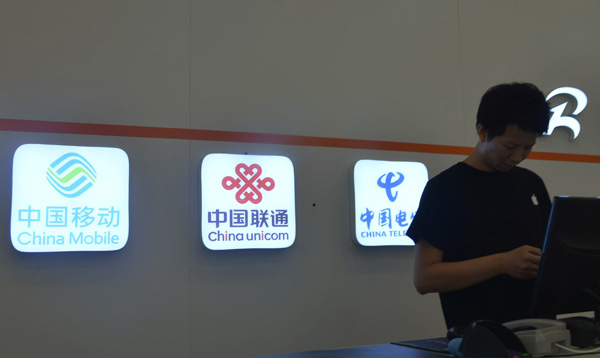|
 |
|
The "Big Three" telecom carriers' latest moves to reduce rates have not impressed customers. Premier Li Keqiang has recently and repeatedly requested them to provide better services and lower costs. [Photo/China Daily] |
Chinese netizens are not impressed with the "Big Three" telecom carriers' moves to reduce rates after repeated requests by Premier Li Keqiang, who has demanded better service and lower costs.
More than 100,000 netizens took an online satisfaction survey organized by portal sina.com over the weekend, and most blasted the nation's still high fourth-generation telecom traffic rates. About 85 percent of the respondents said they were "dissatisfied" with the latest round of price reductions, announced by the carriers last week.
"The carriers are just putting on a show; it means little for me as an end-user," said Michael Chen, a 28-year-old pharmaceutical salesman living in Beijing. "I think Premier Li's orders went to waste."
China Mobile Ltd, which serves Chen among 143 million 4G users on the Chinese mainland, said its charges for traffic plans, including 2G and 3G services, will be reduced by more than 35 percent by the end of 2015.
China Telecom Corp Ltd, the second-largest carrier in terms of subscribers, also pledged a 30-percent cut in traffic fees for this year.
The carriers' move followed Li's comments on the nation's expensive mobile data traffic tariffs. He has slammed the high-price, low-quality mobile Internet service on at least two occasions over the last two months and called for rate cuts.
The "Big Three", all State-owned enterprises, swiftly announced new charge plans ahead of the weekend.
But the changes failed to satisfy many customers. Some netizens complained that the cheap rates only apply in the dead of night, when most users are asleep or using wireless hotspots to connect to the Internet at home.
Others were even more critical of the State-dominated telecom system, calling for deeper reform and branding the carriers "liars".
Xiang Ligang, an independent telecom researcher and founder of industry website cctime.com, said the government should lower the carriers' profit targets so that they will have more flexibility over pricing.
The State-owned Assets Supervision and Administration Commission sets an annual profit target for each carrier. With more private investors pouring into the industry, the SOEs are feeling increasing pressure to meet the targets.
"The actual rate cuts cannot be determined by Li. The market will have the final say," Xiang said, adding that carriers will need more 4G subscribers to be able to make significant rate cuts.
China expects to add about 200 million 4G users in 2015, the second year in which this ultra-fast mobile communications technology has been widely used in the country.
The 4G population has been surging since the networks expanded to more cities and service became more stable.
The country had roughly 162 million 4G users at the end of the first quarter, according to the Ministry of Industry and Information Technology. The 4G population was less than 100 million last year.
Industry research consultancy International Data Corp said that lowering rates will spur 4G subscriptions, but the overall effect is not yet clear. The firm has not raised any of its forecasts for this segment.
In absolute terms, traffic charges in China are lower than in developed economies such as the United Kingdom and the United States.
But because personal incomes in China are markedly lower than these countries, Chinese customers spend a bigger proportion of their earnings to buy data quotas.
